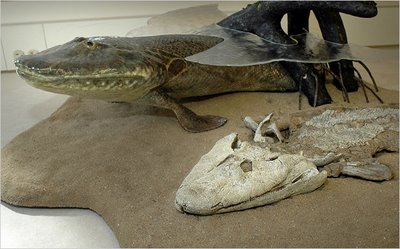Fossil Called Missing Link From Sea to Land Animals and Gospel of Judas' Surfaces After 1,700 Years
The fossil referred to in the first article is was one big, ugly SOB:

But perhaps we should reserve judgment, since it seems likely that he/she/it probably lies somewhere in all our family trees.
Scientists have discovered fossils of a 375-million-year-old fish, a large scaly creature not seen before, that they say is a long-sought missing link in the evolution of some fishes from water to a life walking on four limbs on land.The subject of the second article - Judas Iscariot - is a "big ugly" of another sort. Yet perhaps we should be cautious even here. To quote Reuters:
Judas Iscariot, vilified as Christ's betrayer, acted at Jesus' request in turning him over to the authorities who crucified him, according to a 1,700-year-old copy of the "Gospel of Judas" unveiled on Thursday.What intrigues me about the simultaneous appearance of these two stories is that the scientific "facts" they report -- the bones and the papyrus -- are interesting not so much in themselves as in the suggestion each provides of an evolutionary procress:
In an alternative view to traditional Christian teaching, the Judas gospel shows the reviled disciple as the only one in Jesus' inner circle who understood his desire to shed his earthly body.
"He's the good guy in this portrayal," said Bart Ehrman, a religion professor at the University of North Carolina at Chapel Hill. "He's the only apostle who understands Jesus."
The New Testament contains four Gospels -- of Matthew, Mark, Luke and John -- but many more so-called apocryphal gospels were written in the first centuries after Christ's death, attributed to such disciples as Thomas and Philip and to his female follower Mary Magdalene.How did these "final four" make the cut?
Our beliefs, no less than ourselves, appear to have evolved through some process of selection. Perhaps, in both cases, it was God doing the selecting. But perhaps also it was simply effectiveness.
No comments:
Post a Comment